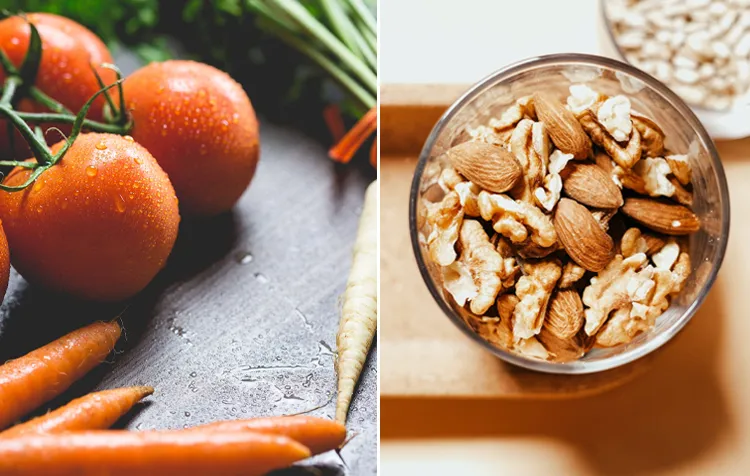Are you looking for the most valuable foods for a heart-healthy diet? Then you've come to the right place! Our heart is a hollow muscle and is one of the most important organs in the human body. It pumps around 80 milliliters of oxygen-rich blood into the arteries of the circulatory system with every heartbeat. That's 10 liters of blood a day - for a lifetime.₁
However, pre-existing conditions and your own lifestyle can affect the work of the heart and the normal functioning of the heart. Heart rate and can lead to heart failure, cardiac arrhythmia, heart attacks or palpitations, for example. To the Heart disease prevention The main advice is to get plenty of exercise, consciously balance stress, undergo preventive check-ups and eat a balanced, healthy diet. Above all, what we eat and drink every day is crucial for heart health.
In this article, I would therefore like to give you the most important tips for heart-healthy eating. You will find out which nutrients and foods are particularly heart-friendly and which products are harmful to the organ in the short or long term. Let's go!
You can find a brief overview here in advance:
Notice: This article is not a substitute for medical advice, but merely provides general information about heart-healthy eating. Please consult your doctor if you feel unwell or want to prevent health problems with medical care.
Nutrients: What characterizes a heart-healthy diet and foods for the heart?

Of course, there are far more heart-healthy foods than I can present to you in this article. It is therefore fundamentally important to know which essential substances what makes the products in question so healthy - and what has a counterproductive effect.
Which food ingredients are particularly important and good for the heart?
- Omega-3 fatty acids
- Niacin
- Dietary fiber
- Antioxidants
- Unsaturated fatty acids
- Vitamin D
- Vitamin B12
- Magnesium
- Coenzyme Q10
- Potassium
- Folic acid
- Vitamin K
- Secondary plant substances
- …
Which food ingredients are harmful to heart health?
- Trans fats
- Saturated fatty acids
- Refined sugar
- High salt content
- Simple carbohydrates
- Artificial additives
- Preservatives
- Alcohol
- …
Food: What should you eat for a healthy heart?
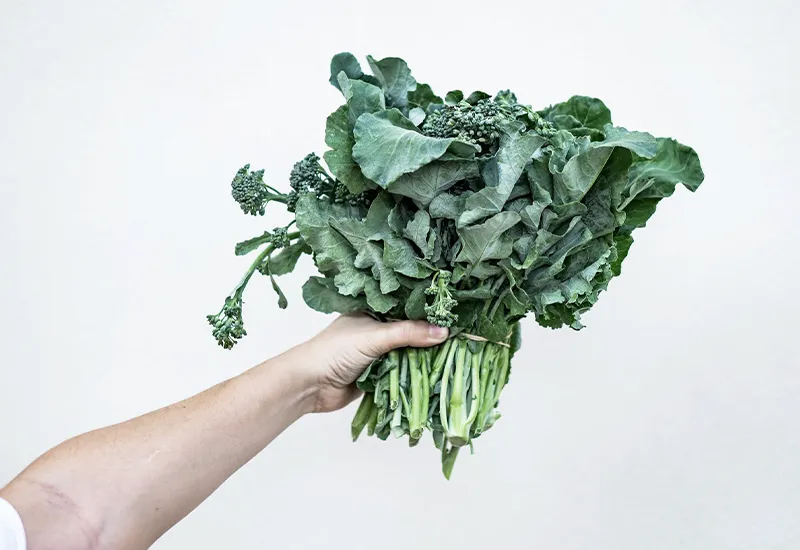
Now we can move on to the specific foods that contain many of the most important nutrients for a healthy heart. You should eat the following agricultural products be sure to eat more oftenif you want to prevent any dangerous heart disease.
Important: Some sea fish, such as salmon, herring, mackerel or tuna, are rich in omega-3 fatty acids and therefore quite healthy for the heart. However, as there are plant-based alternatives, fish sentient animals are and we are the Stopping overfishing of the oceans want, the focus in this article is on vegan foods.
1. kale
Kale is above all rich in antioxidants, vitamin K, Vitamin C and dietary fiber. These nutrients help to reduce inflammation and promote heart health. Vitamin K in particular protects the arteries and promotes blood clotting.
2. tomatoes
Tomatoes contain besides vitamins and fiber also lycopene, a plant substance with strong antioxidant properties. Low levels of lycopene in the blood were already scientific is associated with an increased risk of heart attacks and strokes.
3. olive oil
Olive oil is rich in simple unsaturated fatty acids and antioxidantswhich reduce inflammation and promote heart health. The popular food can be used in many dishes and can help to reduce your cholesterol levels and blood pressure - and not least the risk of heart disease.₃
4. avocado
Avocados contain mainly unsaturated fatty acids, fiber and potassium. These substances in the heart-healthy fruit have a lipid-lowering and cardioprotective effect and can also promote heart health.₄
-
 Vegan on the job15 €
Vegan on the job15 € -
 Cooking for the climate18 €
Cooking for the climate18 € -
 Vegan cliché Adé25 €
Vegan cliché Adé25 €
5. carrots
By eating carrots more often, you are primarily Beta-carotene, vitamin A, potassium and fiber to. As these nutrients keep the blood vessels healthy, vegetables should of course not be missing from the list of heart-healthy foods.
6. broccoli
Among other things, broccoli is rich in Dietary fiber, magnesium, potassium and Vitamin K. Vitamin K deficiency in particular is often associated with arteriosclerosis. Broccoli is therefore also one of the most important foods for the heart.
7. watermelon
Melons are rich in Vitamins, minerals and antioxidants. Using the with the Lycopene extract it also reduces oxidative stress and thus counteracts cardiovascular disease. They also support heart health by reducing inflammation and regulating blood pressure.
8. ginger
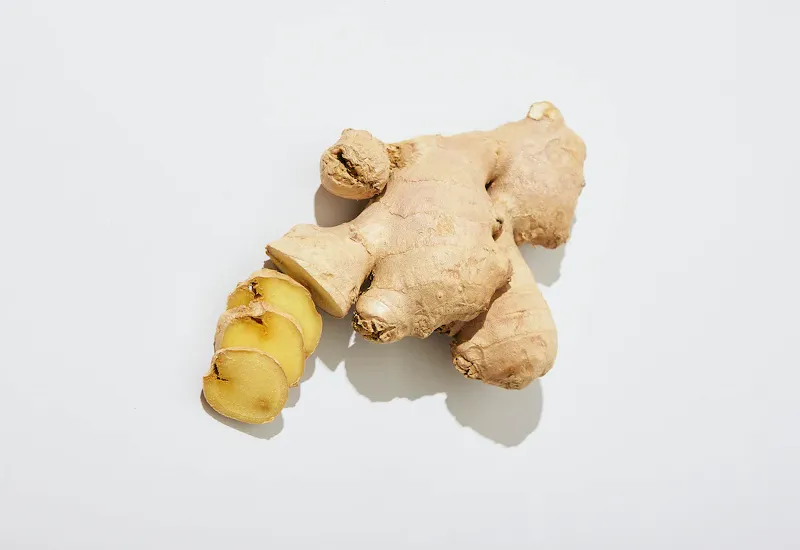
Among other things, ginger is rich in Potassium and magnesium and has anti-inflammatory and antioxidant properties. It can help to lower blood pressure and prevent the formation of blood clots. This is why the versatile, healthy tuber should not be missing from any heart-healthy food list.
9. onions
Onions are also part of a healthy diet for the heart. They contain valuable Antioxidants, as well as Magnesium and potassium and can help to lower cholesterol levels. If you want to live a heart-healthier life, you should include red onions in your meals more often.
10. garlic
The consumption of garlic acts Disinfectant, blood-thinning, lowers blood pressure and cholesterol and can improve blood circulation in the coronary arteries. Garlic also helps to lower blood lipid levels, making it one of the most effective foods against heart disease.
11. asparagus
Asparagus is rich in Vitamins, potassium and antioxidantsdehydrates the body, reduces the "metabolic waste" homocysteine, lowers blood pressure and ensures a regular heartbeat. Finally, eating asparagus can also reduce dangerous inflammation and lower the risk of heart disease. A versatile food for a truly heart-healthy diet.
12. pumpkin
Fortunately, pumpkins are rich in fiber, vitamins and Potassium and can therefore alleviate cardiac arrhythmia and other heart problems. You can also prevent the formation of blood clots, which can trigger heart attacks, by eating pumpkin regularly.
13. sauerkraut
When it comes to nutrition tips for a healthy heart, sauerkraut is a must. The fermented food contains valuable Probiotics, as well as and vitamin C and potassium. Eating it supports heart health by minimizing inflammation and regulating blood pressure.
14. linseed oil
Organic linseed oil (but also hemp oil or algae oil) has an anti-inflammatory and antibacterial effect and has Omega-3 fatty acidswhich reduce inflammation and promote heart health. Above all, α-linolenic acid is used for blood formation and helps to lower blood pressure and cholesterol levels. It can help to lower blood pressure and cholesterol levels.
15. sprouts
Sprouts are also medicinal foods because they are rich in Vitamins, minerals and antioxidants are. By making them a regular part of your diet, you are helping to reduce LDL cholesterol levels to protect your cardiovascular system.
16. berries
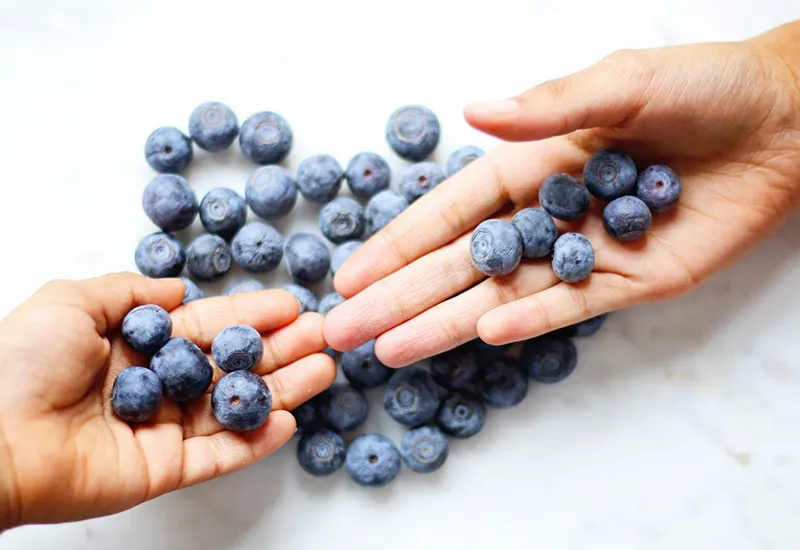
Especially blueberries, blackberries, strawberries and black raspberries are rich in Antioxidants, vitamins, fiber. They are one of the best sources of phytochemicals and help to naturally lower blood pressure, for example. So if you want to protect your heart, these berries should ideally be a valuable part of your daily breakfast.
17. whole grain products
Whole grain products (e.g. quinoa, bulgur, whole grain pasta or millet) are rich in Dietary fiberwhich lower cholesterol levels and promote your heart health. They also contain important B vitamins and can, According to studiesimprove the cholesterol level in your blood and minimize the risk of heart disease.
18. legumes
Pulses such as peas, beans and lentils, as well as soybeans and chickpeas, are valuable sources of protein and contain above all Dietary fiber, potassium and magnesium. They are a great meat substitute, can lower blood pressure, regulate LDL cholesterol levels and significantly reduce the risk of heart disease.
19. oatmeal
Oat flakes also contain large quantities of soluble Dietary and healthy fiber, protein and magnesium. Eating them regularly (for example for breakfast together with some soy yoghurt) helps to lower your cholesterol levels. They also promote your heart health as they keep you full for a long time, preventing hunger pangs and obesity.
20. nuts
Nuts are rich in Protein, fiber, magnesium, vitamin E, antioxidants and healthy fats.. Walnuts and almonds in particular contain large amounts of polyunsaturated omega-3 fatty acids. Among other things, these can reduce dangerous vascular deposits and protect you from a heart attack. Nuts also serve as a healthy snack between meals and are therefore also an ideal food for a heart-healthy diet.₅
Heart-healthy recipes with the most important foods for the heart
You should therefore include these foods in particular in your meals more often to protect your heart and blood vessels. You still lack inspiration? Here I have simply picked out three heart-healthy recipes for delicious dishes that you can cook for a good start:
- Grilled tofu and asparagus with ginger cauliflower rice
- Dill carrots with fennel and spring onions
- Broccoli curry with coconut milk, carrots and chickpeas
- …
What recipes can you recommend? I look forward to your ideas and suggestions in the comments.
NoGos: Which foods are bad for heart health?
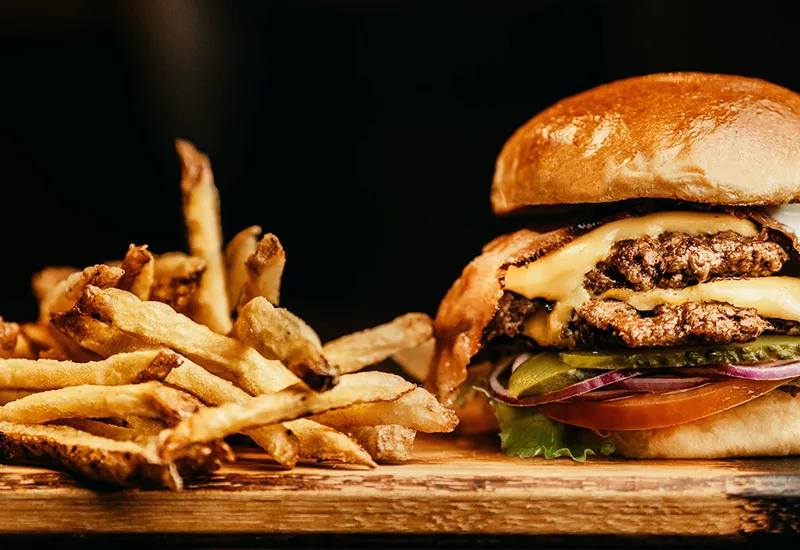
A heart-healthy diet must also not be perfect. Of course you can indulge your cravings from time to time. Nevertheless, it is of course also good to know which (especially processed) foods you should eat less often or not at all, as they can damage your heart health. I have therefore compiled a small list of heart-damaging foods for you here.
1. red meat
Red meat is rich in cholesterol and produces harmful substances that promote blood clotting can. This is another reason why regular consumption of beef steak or pork chops, for example, increases the risk of a heart attack, such as Nutritionists: inside found out.₆
2. sausage
Sausages often contain Saturated fatty acids and saltwhich can increase the risk of heart disease. Eating a large slice of ham, bacon and sausage products (50 grams) every day increases the risk of cardiovascular disease by 42 percent.₆
3. fast food and fried food
Fast food and fried food are especially rich in trans fats and salt. Regular consumption also increases the risk of obesity, high blood pressure, heart attacks and strokes many times over and is therefore not part of a heart-healthy diet.₇
4. ready meals
Ready meals often contain high amounts of salt, sugar, unhealthy fats and artificial additiveswhich can put a strain on the heart. According to studies, each portion increases the likelihood of suffering from cardiovascular disease.₈
5. margarine
If you want to eat in a heart-healthy way, you should also Trans fats from margarine, as just one teaspoon a day can increase the risk of coronary heart disease by 10 percent in the future.₉
6. sweets
Sweets generally contain a lot of refined sugar and are addictive. As sugar increases the risk of cardiovascular disease, it is absolutely not compatible with a heart-healthy diet.₁₀
7. alcohol
To prevent heart problems you should drink a lot, but water and no alcoholic drinks. Excessive, regular alcohol consumption increases blood pressure, leads to inflammatory reactions in the body and can trigger cardiac arrhythmia. It also increases the risk of heart disease because it disturbs your sleep at night, causes you to stop breathing and thus increases the risk of atrial fibrillation.₁₁
8. soft drinks
Soft drinks and energy drinks contain a lot of sugar and caffeine and remove potassium from the body. A low potassium level in the blood can lead to cardiac arrhythmia and heart failure. lead to cardiac arrest in the worst case. They also increase the risk of obesity, elevated blood sugar levels and bad cholesterol levels - and therefore common causes of heart disease.
Frequently asked questions about nutrition for the heart
What should you not eat if you have heart problems?
In order to prevent heart problems and in case of existing heart problems, one should especially take into account the Limit consumption of saturated fats, trans fats, salt, sugar and alcohol. Avoid processed foods, fast foods and fried foods, among others.
What is the healthiest thing for the heart?
The healthiest foods for the heart are those that rich in omega-3 fatty acids, fiber, antioxidants and heart-healthy minerals are. Examples include green leafy vegetables, nuts, oats, berries, pulses, tomatoes, carrots and onions.
Which fruit is good for the heart?
Heart healthy fruits are for example Berries, apples, citrus fruits, bananas and grapes. They are rich in fiber, vitamins and antioxidants that promote heart health.
Heart-healthy nutrition, made easy!

A heart-healthy diet is of crucial importance to keep your heart healthy. Reduce the risk of heart disease and increase your well-being. Now you have learned about many essential nutrients and foods for the heart and can integrate them into your diet - also with the help of the suggested recipes.
"The way to health leads through the kitchen, not the pharmacy."
Sebastian Kneipp (more at Food quotes)
Finally, here are a few more further contributionswhich you can also use to promote your heart health:
- Lose weight vegan - Lose weight with a plant-based diet
- Lose weight healthily - tips for natural weight loss
- Mental regeneration - tips to really switch off
- Becoming more relaxed - tips for more serenity in everyday life
I very much hope that with this article I have helped you to have a stronger heart and a healthier lifestyle can help. Do you have any questions, suggestions or other foods for a healthy heart that should definitely be mentioned here? Then I look forward to your comment.
Stay healthy,

PS: Still not quite sure why a purely plant-based diet is so beneficial? Here I present my Reasons for the vegan lifestyle before - and I can also give you this vegan documentaries which have already opened the eyes of many people.
References
₁ P. Rosenkranz: Circulation, pulse and blood pressure measurement (as of 08.03.2021), available at https://www.planet-wissen.de/natur/anatomie_des_menschen/blut_saft_des_lebens/pwiekreislaufpulsundblutdruckmessung100.html. [08.05.2023].
₂ K. Maresz (2015): Proper Calcium Use: Vitamin K2 as a Promoter of Bone and Cardiovascular Health, available at https://www.ncbi.nlm.nih.gov/pmc/articles/PMC4566462. [08.05.2023].
₃ M. Guasch-Ferré, D. B. Hu, M. A Martínez-González (2014): Olive oil intake and risk of cardiovascular disease and mortality in the PREDIMED Study, available at https://pubmed.ncbi.nlm.nih.gov/24886626. [08.05.2023].
₄ J. Tabeshpour 1 2 , B. M. Razavi 3 , H. Hosseinzadeh (2017): Effects of Avocado (Persea americana) on Metabolic Syndrome: A Comprehensive Systematic Review, available at https://pubmed.ncbi.nlm.nih.gov/28393409. [08.05.2023].
₅ German Medical Association: Consumption of nuts prevents cardiovascular diseases and cancer (as at: 07.12.2016), available at https://www.aerzteblatt.de/nachrichten/71855/Verzehr-von-Nuessen-vermeidet-Herz-Kreislauf-Erkrankungen-und-Krebs. [08.05.2023].
₆ Focus Online: Heart risk - all-clear for red meat, beware of sausage (as at: 30.07.2014), available at https://www.focus.de/gesundheit/ernaehrung/news/entwarnung-fuer-rotes-fleisch-vorsicht-vor-der-wurst-herzrisiko_id_1762534.html. [08.05.2023].
₇ P. Qin, M. Zhang, M. Hang et al. (2021): Fried-food consumption and risk of cardiovascular disease and all-cause mortality: a meta-analysis of observational studies, available at https://heart.bmj.com/content/early/2021/01/07/heartjnl-2020-317883.info. [08.05.2023].
₈ A. Clark: Ultra-processed food is associated with cardiovascular disease (as of 27.08.2021), available at https://www.bhf.org.uk/what-we-do/news-from-the-bhf/news-archive/2021/august/ultra-processed-food-is-associated-with-cardiovascular-disease. [08.05.2023].
₉ Deutsche Apotheker Zeitung: Arzneimittel und Therapie - Koronare Herzkrankheit: Gehärtete Fette gefährden die Gesundheit (as of: 31.05.1998), available at https://www.deutsche-apotheker-zeitung.de/daz-az/1998/daz-23-1998/uid-3418. [08.05.2023].
₁₀ C. Rehberg: Zucker - Risiko fürs Herz (30.06.2022), available at https://www.zentrum-der-gesundheit.de/news/gesundheit/allgemein-gesundheit/zucker-herz. [08.05.2023].
₁₁ Swiss Heart Foundation: How much alcohol can the heart tolerate? (as of 10.06.2022), available at https://swissheart.ch/wissen-und-support/dossiers/wie-viel-alkohol-vertraegt-das-herz. [08.05.2023].

